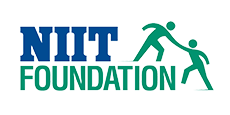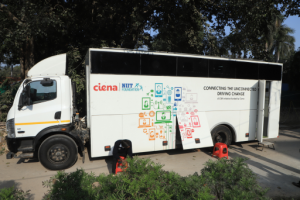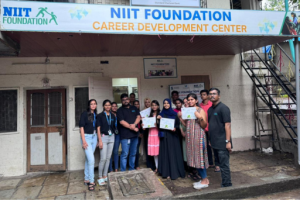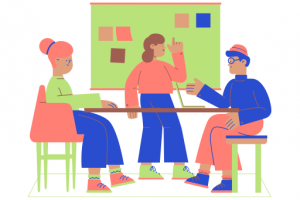The necessities for human prosperity in the 21st Century are continuously evolving. It has however, become apparent to educators that the world is moving towards digital, and education must evolve to equip students with more than just academic knowledge. The traditional model of rote learning is no longer enough. To succeed in a continuously evolving world, students need a strong foundation in 21st Century learning skills.
These skills are categorized as the four C’s – namely, critical thinking, creativity, collaboration, and communication. These four core competencies are essential for improving future prospects and also enable students to be active participants in society. NIIT Foundation has committed itself to preparing students for the future by embedding these skills into the core of its educational programs.
Critical thinking enables students to analyze information, solve complex problems, and make informed decisions. Classroom led learning at NIIT Foundation is designed to encourage inquiry and reasoning. Rather than focusing solely on the ‘right answer,’ NIIT Foundation promotes a culture where asking thoughtful questions and exploring multiple solutions is encouraged. This is being done through case studies, problem-solving tasks and reflective exercises, that compel a student to engage at a deeper level.
Creativity is another strong pillar. Every student has a unique approach to doing things. To encourage this, the programs incorporate experiential learning modules, and innovation-led approach to training programs. This not only helps students to learn independently but also enables them to stand out during the placement process that is conduct for students every year.
Creativity and individualistic expression is certainly the need of the hour, however, NIIT Foundation has also espoused the need for collaborative learning. This is because students are availing career opportunities in some of the biggest private enterprises in India, and with that comes a need to be able to work effectively in a team. The students train for this by engaging in group assignments, and peer-led learning sessions to develop mutual respect for one another, their viewpoints and achieve shared goals.
Communication skills are also a key focus. Being able to express ideas clearly, listen actively, and engage in meaningful dialogue is vital in all areas of life. The students are provided with numerous platforms to enhance their communication abilities through presentations, classroom discussions, and debates. These activities help build self-confidence and the ability to convey ideas in a compelling and articulate manner.
To ensure students are equipped to succeed in their professional and personal lives, technology integration is key. NIIT Foundation leverages tools to make learning interactive, personalized, and accessible. For example, the LMS technology ensures that education is not limited to the classroom and is accessible to all the students enrolled. This allows students to think critically, and creatively while learning at their own pace, because sometimes students may be inhibited in a classroom with their peers.
Ultimately, the goal is to ensure education is delivered to meet the needs of today and tomorrow of all the students. NIIT Foundation aim to develop individuals who are both academically competent, and capable of thinking along the four C’s.
















